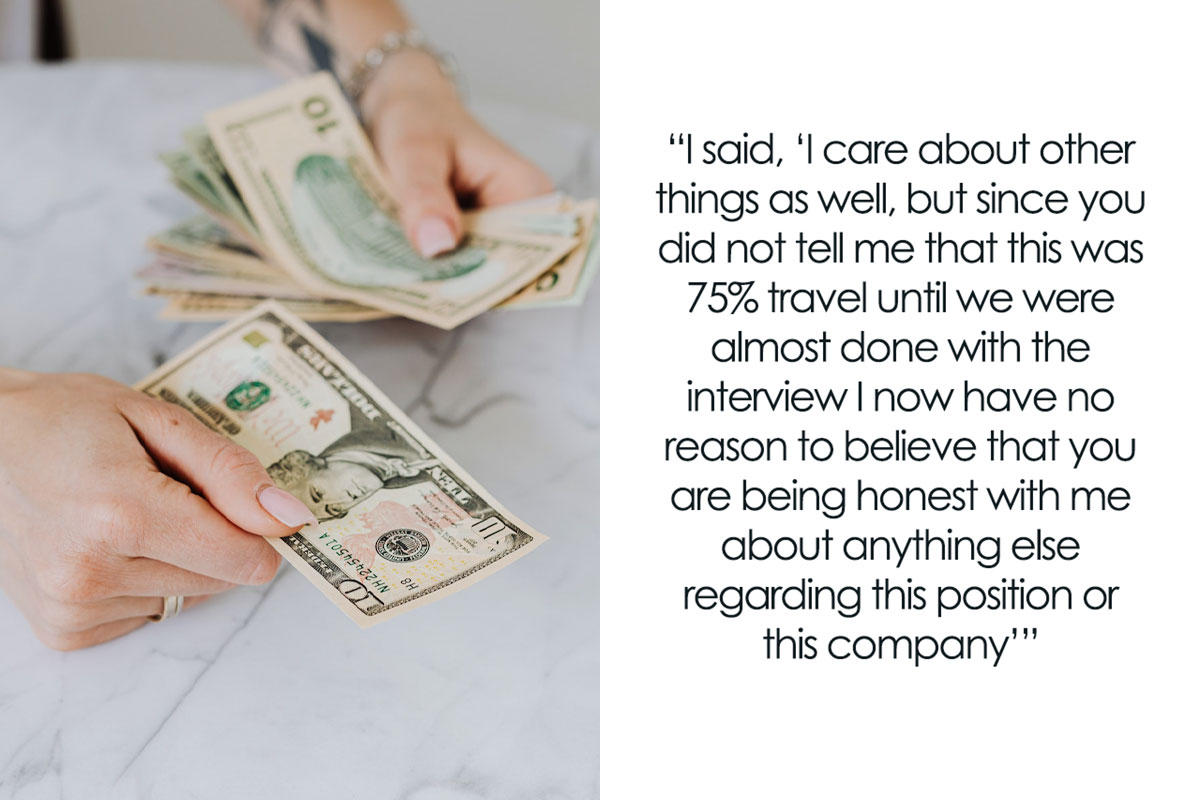
Recruiters Request Woman To Travel 75% Of The Job, She Boldly Requests Doubled Salary For That
Interview With AuthorWhile reading through various job openings, it is natural to expect them to showcase the attractive side of the job, for the simple reason of attracting good employees. However, such a tendency might sometimes go to extremes by withholding crucial aspects of a certain position and catching the inexperienced candidate off guard during the interview process.
This is what didn’t happen to this Redditor, as she knew just what she was worth and shocked the interviewers herself when she explained she would require double what their maximum listed salary for the position was after the hiring team finally mentioned that the job was 75% traveling.
More info: Reddit
A woman was applying for a job that seemed less stressful than her previous position but wasn’t really so
Image credits: Elevate Digital (not the actual photo)
By the end of the interview, the job applicant was finally told the job was mostly international travel
Image credits: SamanathaTheGreat
Image credits: Karolina Grabowska (not the actual photo)
Image credits: SamanathaTheGreat
The applicant explained she would require double what their maximum listed salary for the position was
Image credits: Cytonn Photography (not the actual photo)
The recruiters seemed shocked and acted like the woman was being unreasonable and only cared for money
A woman brought her job interview experience to the Antiwork subreddit after she was introduced to some key aspects of the job position at the end of the interview and didn’t fail to adjust her conditions either.
The applicant explained that she is finally in a position financially to choose a less stressful job, in addition to having decades of experience in her field of work. Either way, the job she was applying for seemed to be less stressful than her previous position and did not include a pay cut.
During the interview, the applicant could tell the hiring team loved her qualifications despite them trying to downplay them, so they wouldn’t have to pay her nearly what she was worth. The unexpected part came at the very end when the recruiters introduced that the job was almost all international travel.
The applicant agreed to it but explained she would then require double what their maximum listed salary for the position was, due to the stress caused by a position that was 75% traveling. The hiring managers seemed shocked and acknowledged that they purposely withheld this information, as: “people are not interested if they tell them up front.”
The applicant clarified she was okay with a change in the deal, but she stuck with the change from her side as well, which led to the hiring managers looking at each other and ending the interview just after telling the applicant they would get back at her. According to the Redditor, even at that rate she is a good deal, and: “they know it.”
The applicant explained that as they changed the deal, she would as well
Image credits: Zaskoda (not the actual photo)
The hiring team told the applicant they would get back to her and the interview was over
Bored Panda got in touch with the original poster and she kindly agreed to share more about her experience with job interviews, revealing that unfortunately, it wasn’t her first time that a job description didn’t really match the reality of a role. She added that “Employers in the USA are constantly like this. They have little concern or care for their workers.”
We also wished to know whether the interviewers did get back to the applicant, which they did not, and to our question whether the woman felt she might have shamed the interviewers at least a little to make them reconsider their working conditions or job description, the woman answered she doubts they felt ashamed of their behavior at all.
Finally, we inquired about the original poster’s opinion about the role of self-worth during job interviews and what might help here and this is what she had to say: “In the USA, it’s hard for workers to know their worth because the rich have been spending billions to make sure that workers are barely able to scrape by. So those workers feel grateful for anything. The best answer for it is to unionize. A collective props up the individual.”
Negotiating salary when applying for a job was discussed by Robert Half in the piece When and How to Negotiate Salary With an Employer, noting that while being compensated fairly for one’s skills has a direct impact on job satisfaction, when discussing compensation during an interview, the job applicant needs to be diplomatic and prepared.
For this reason, they advise getting one’s figures right by researching what’s a fair starting salary for the position, industry, and company the applicant is considering.
Another point brought up in the list was the right timing and tact, as showing that one is flexible is the key to working out a compensation package that’s acceptable to both sides. Robert Half emphasized the importance of expressing one’s interest in the job and the strengths the applicant would bring to it before asking for the salary range, in such a way making the employer feel confident a job candidate is there for more than just the paycheck.
Finally, they suggested presenting a strong case, as in most negotiations, one needs to give solid reasons for a certain position. This can include talking specifically about their skills, experience, and prior successes. However, Robert Half advised strongly against bluffing, noting that the truth will eventually come out, therefore misleading a prospective employer about one’s current compensation in an effort to get more money is a bad idea. For this reason, they suggested focusing on what the job applicant can bring to the organization when discussing salary during an interview.
What’s your experience when applying for a job? Did you ever get into a similar situation when important details about a position were withheld by an employer or you felt you were being lowballed? Share your experience in the comment section!
Redditors shared their takes on the situation
107Kviews
Share on FacebookThis sort of thing is fairly common, unfortunately. I've applied for a job advertised as one thing, was up front asked my salary requirements based on the job as described at the time, then after 2 more interviews found the job was much larger and more important than had initially been described. They offered to hire me at... the salary I said at the beginning. I declined and they were mad. I explained the job description radically changed during the process, which they acknowledged was true, and that meant my salary requirement would change as well. They didn't like that. They refused to budge. I told them Byeeeee.
I will never understand how a company can accuse someone of "only being in it for the money." Of course I am only in it for the money. If I didn't need the money, I would spend my time petting dogs and creating terrible paintings.
Exactly, if you're not in it for the money then you'd take a 100% pay cut right?
Load More Replies...What the hell was with the person asking why no spouse no kids? NOYB, that's why. What a weird detail to focus on. With respect to the actual subject, I hope OOP does get hired. Companies that for intent to use and abuse their employees deserve to get used and abused right out of business.
I wanted to upvote her perfect response to that question, but ofc can't, so have my upvote!
Load More Replies...This sort of thing is fairly common, unfortunately. I've applied for a job advertised as one thing, was up front asked my salary requirements based on the job as described at the time, then after 2 more interviews found the job was much larger and more important than had initially been described. They offered to hire me at... the salary I said at the beginning. I declined and they were mad. I explained the job description radically changed during the process, which they acknowledged was true, and that meant my salary requirement would change as well. They didn't like that. They refused to budge. I told them Byeeeee.
I will never understand how a company can accuse someone of "only being in it for the money." Of course I am only in it for the money. If I didn't need the money, I would spend my time petting dogs and creating terrible paintings.
Exactly, if you're not in it for the money then you'd take a 100% pay cut right?
Load More Replies...What the hell was with the person asking why no spouse no kids? NOYB, that's why. What a weird detail to focus on. With respect to the actual subject, I hope OOP does get hired. Companies that for intent to use and abuse their employees deserve to get used and abused right out of business.
I wanted to upvote her perfect response to that question, but ofc can't, so have my upvote!
Load More Replies...
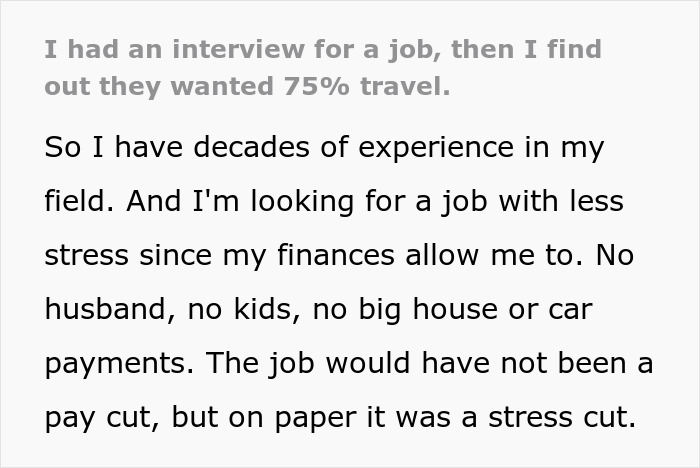
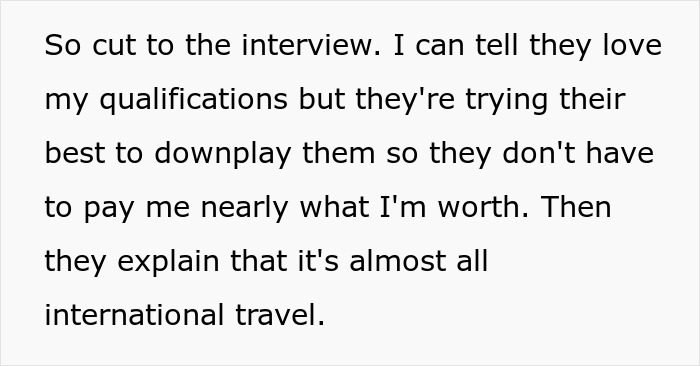
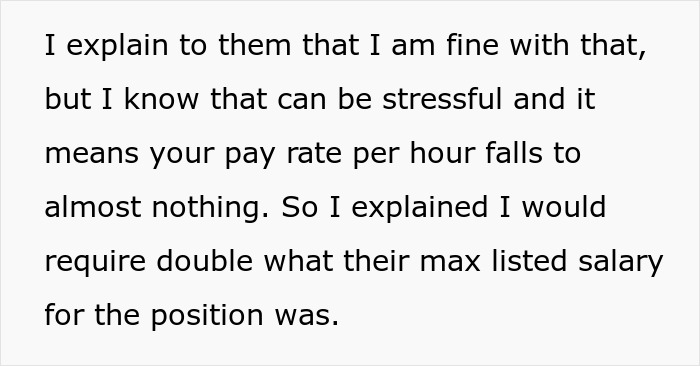


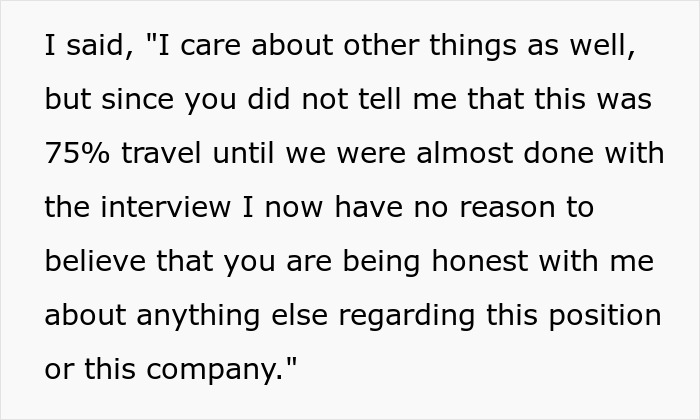

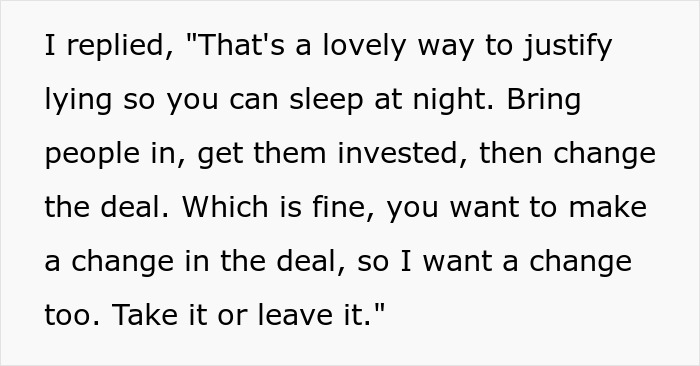

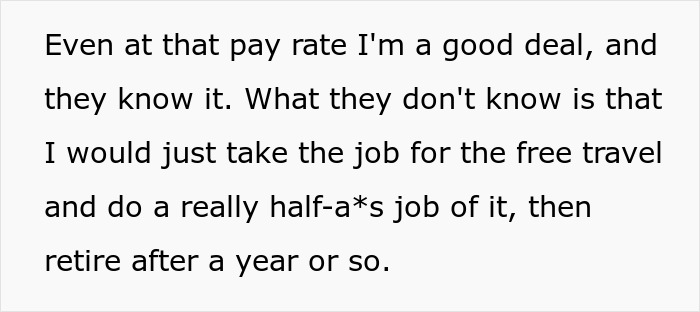

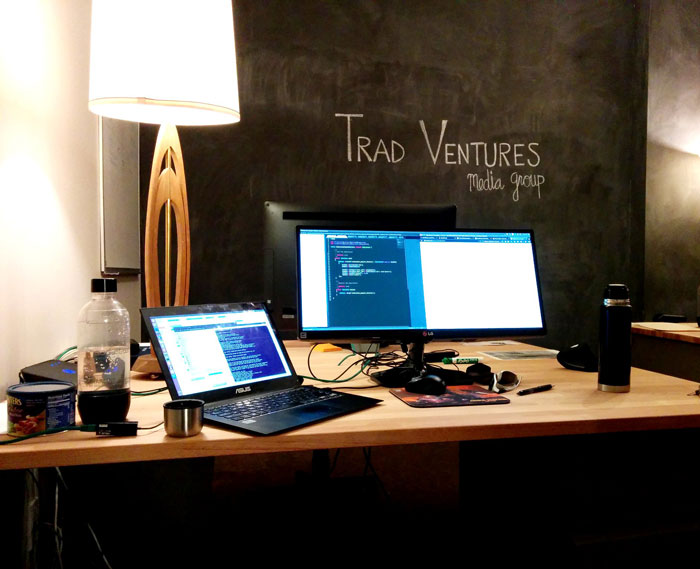
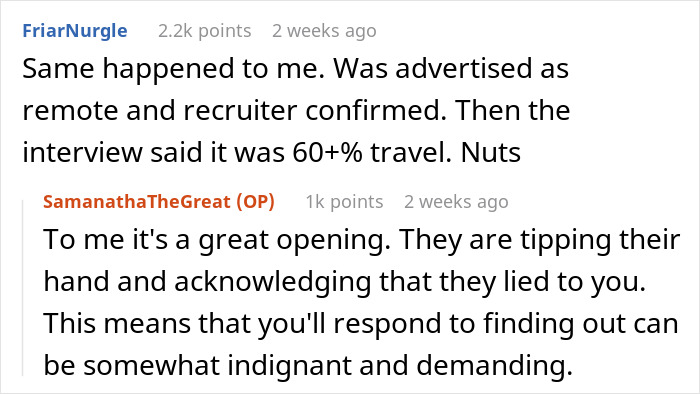
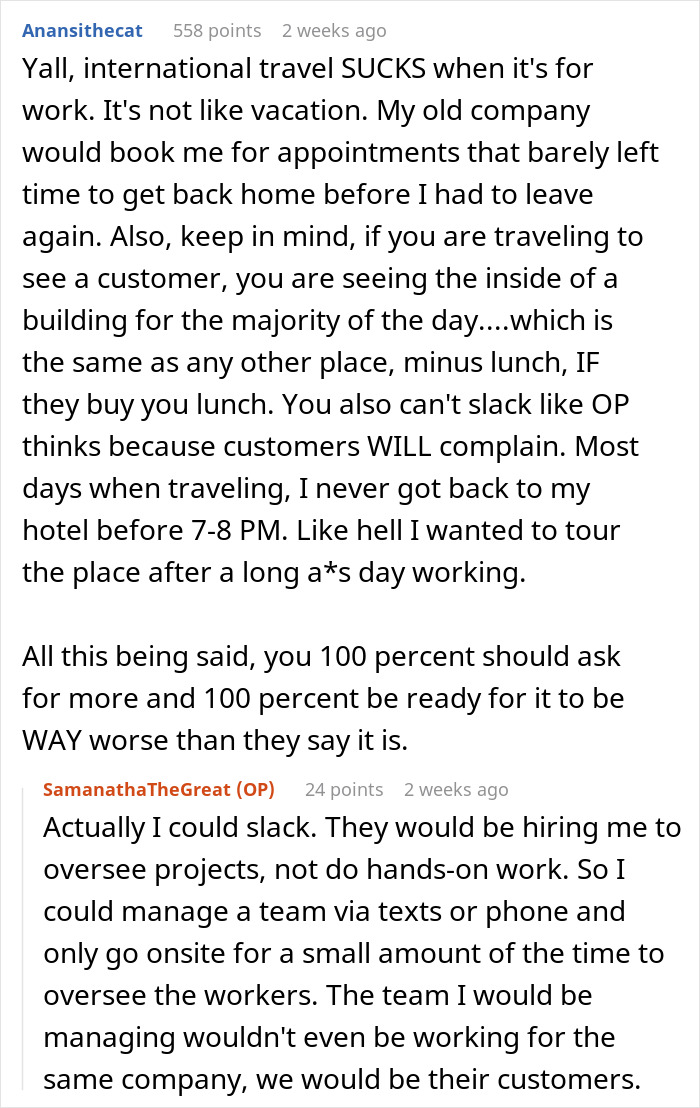
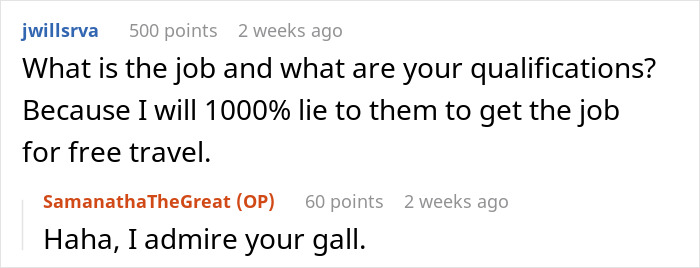
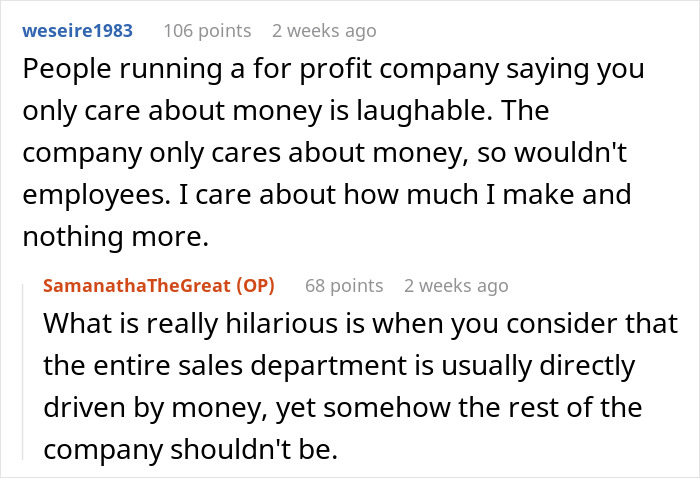
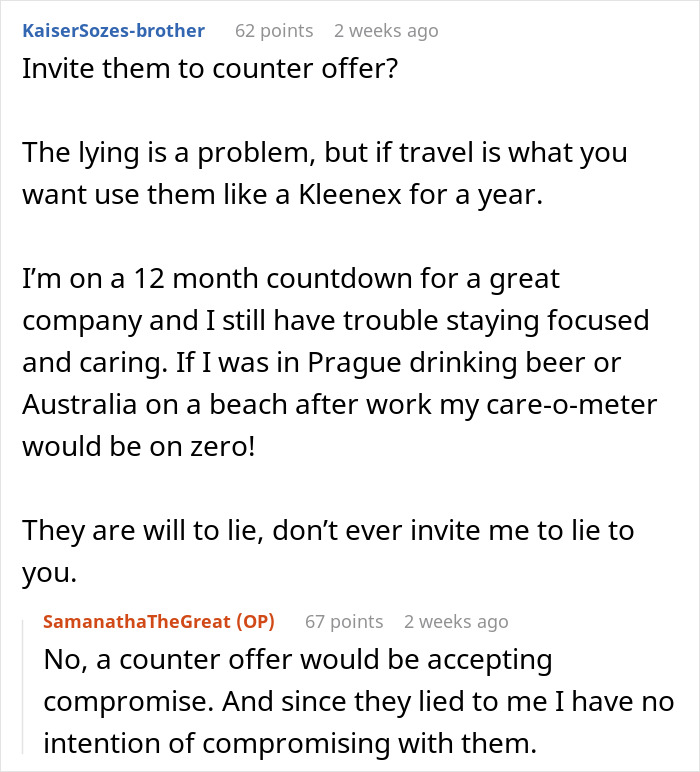
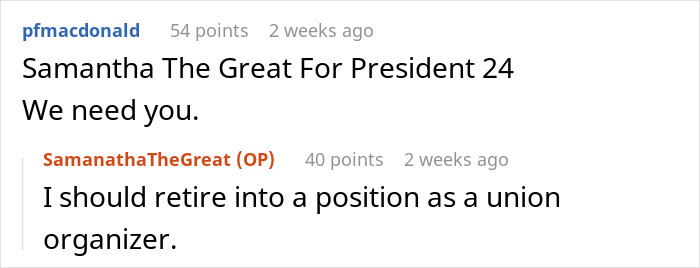
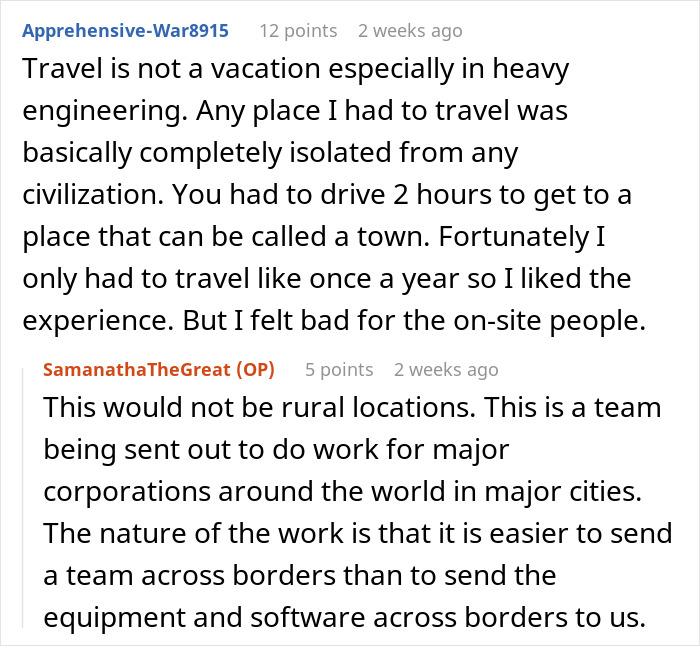

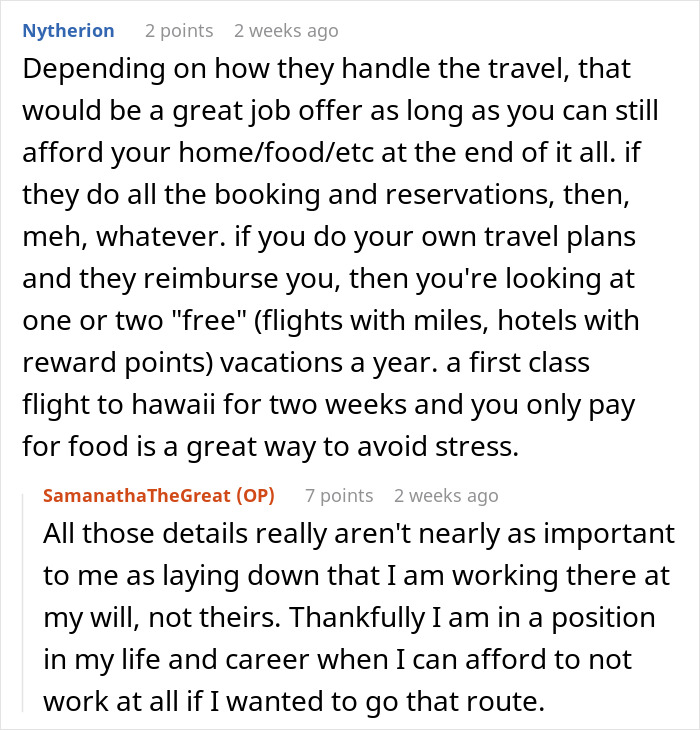

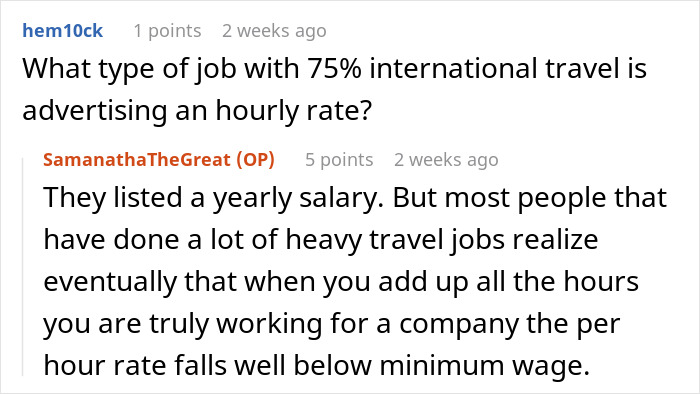
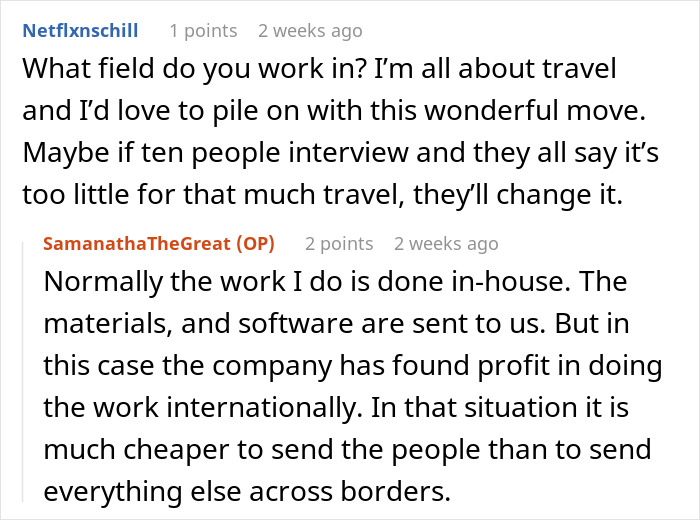
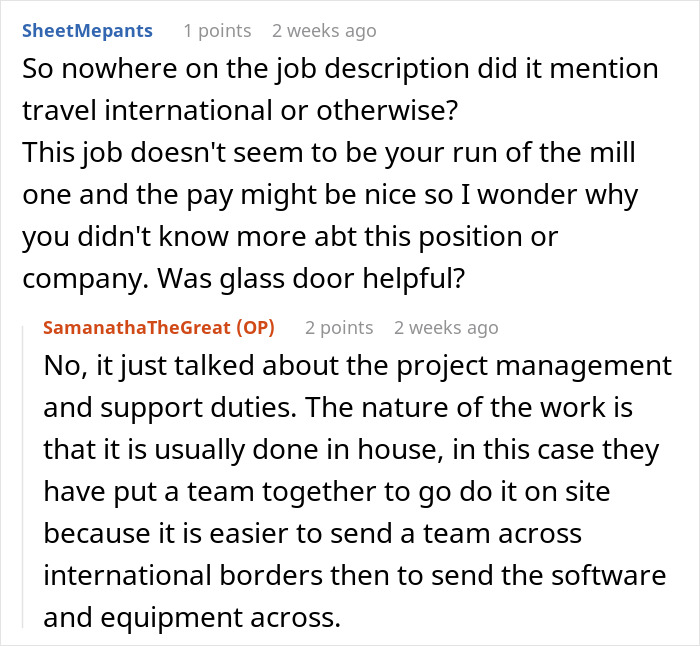




50
22